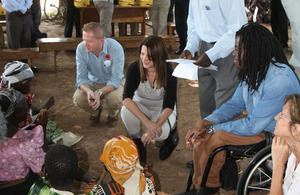Featherstone: World must wake up to 'great neglect' of disability
Britain will spearhead a new drive to put disability at the forefront of the world's development efforts, UK international development Minister Lynne Featherstone has announced.

Development Minister Lynne Featherstone and Paralympic champion Ade Adepitan meet disabled people in Uganda who are being helped by UK aid. Picture: Jo Cooke/DFID
Speaking from Uganda after a fact-finding mission with UK Paralympic champion Ade Adepitan, Lynne Featherstone pledged that Britain will urge other countries and charities to join our efforts to get disability included in international poverty reduction targets.
Minister Lynne Featherstone said:
Disabled people still suffer great neglect across the world. The international community - including some major charities - have done far too little to address this in the past.
The simple fact is that we will never solve the root causes of poverty unless we end the discrimination and prejudice disabled people face every day.
Ade and I have seen how smart and simple changes in Uganda are making an enormous difference.
The ongoing discussion about the future UN poverty goals is a once in a generation chance to start to address this shameful inequality.
During their visit, Ade Adepitan and Lynne Featherstone saw a range of British aid projects which provide training, support and education for disabled people. This included a school for blind children supported by the UK’s Olympic legacy programme, International Inspiration. They also saw a community support programme and a state school where WaterAid have installed a new disabled toilet.
More than a billion people live with a disability. They face unequal access to education, employment, healthcare, social support and justice as a result. Some estimates show that almost 90% of children living with disability in Africa do not regularly attend school.
In Uganda, 5 million people are disabled.
Uganda is at the forefront of the disability movement in Africa. An Act of Parliament ensures legal protection and equal opportunities for persons with disabilities and an annual grant of 30 million Uganda Shillings (£7,000) is given to each district to support the needs of people with disabilities. In addition, the Ugandan constitution also recognises sign language as a national language.
Britain’s pledge follows Lynne Featherstone’s announcement last month that children with disabilities in the developing world will be able to access and use all schools built from now on with direct UK funding.
Notes to editors
-
Images from the trip are available on request.
General media queries (24 hours)
Email mediateam@dfid.gov.uk
Telephone 020 7023 0600
If you have an urgent media query, please email the DFID Media Team on mediateam@dfid.gov.uk in the first instance and we will respond as soon as possible.